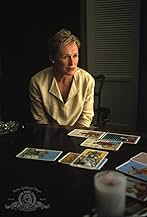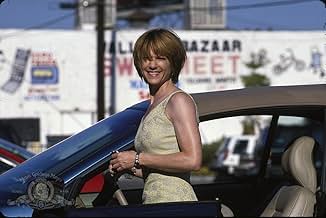IMDb रेटिंग
6.4/10
7.6 हज़ार
आपकी रेटिंग
अपनी भाषा में प्लॉट जोड़ेंFive California women struggle with personal problems as their own paths unwind in unexpected ways.Five California women struggle with personal problems as their own paths unwind in unexpected ways.Five California women struggle with personal problems as their own paths unwind in unexpected ways.
- 1 प्राइमटाइम एमी के लिए नामांकित
- 2 जीत और कुल 1 नामांकन
Penelope Allen
- Nancy (segment "Fantasies About Rebecca")
- (as Penny Allen)
फ़ीचर्ड समीक्षाएं
The only other movie I've ever been moved to write a comment for was Mission to Mars. Unlike MtM, which I was moved to review due to it being one of the very worst movies I've ever seen, this one is truly touching. Things You Can Tell... is a testimony that an American movie, with well-known American actors, can be delicate, beautifully acted, and most of all, not chewed and explained to death. It does not regard its viewers as braindead; neither does it regard them as artsy. It is a movie for everyone, about people just like us.
This is not an art-house movie - the story plot is a collection of stories about the everyday lives of everyday women (the reviewer who said she never seen such repulsive characters might be in for a shock if she actually talks to her daughter / mother / sister).
It shows women beautifully, and absolutely believably. It also shows nicely that diversity is not a question of the skin color, but of the attitude (hence the stories feature only white women).
It's also not a chick flick - while certainly it will be loved by women, it also works for cynical, hard to move guys like me.
Watch it, it's really good, in a not-in-your-face, subtle way.
This is not an art-house movie - the story plot is a collection of stories about the everyday lives of everyday women (the reviewer who said she never seen such repulsive characters might be in for a shock if she actually talks to her daughter / mother / sister).
It shows women beautifully, and absolutely believably. It also shows nicely that diversity is not a question of the skin color, but of the attitude (hence the stories feature only white women).
It's also not a chick flick - while certainly it will be loved by women, it also works for cynical, hard to move guys like me.
Watch it, it's really good, in a not-in-your-face, subtle way.
Some questions remain without a plausible answer: why did THINGS YOU CAN TELL JUST BY LOOKING AT HER go direct to cable TV in the US? I don't know and I'm still angry about that, since it has a great cast and was very well received in Cannes. Fortunately, it was received a limited release here in Brazil, where it was a kind of art-house hit during the time of the year when only blockbusters have their place in the sun. The secret of its success here is not hard to understand: audiences who were tired of Hollywood crap found a small, quiet dramatic comedy with a good story, some heart-breaking moments (and some very funny ones, too) and terrific performances. This is the kind of film that touches everyone, even the coldest and most serious person, making them laugh and feel deep emotions. Despite its division in five stories, all of them excellent (except the part with the lesbian, which was too small), this film is carefully paced, helping us to understand each character's emotions. And each story has an interesting link to the other.
If I had to choose my favorite part, I would have to think. The Dr. Keener story is sad and quiet, the one with Rebecca is the most thought-provoking, while the dwarf story is touching and funny, and the sister-sister story brilliantly closes the film.
If you haven't seen this yet, watch it now. There are not many good films with "women" as the main subject, but this one is one of the best I've seen. It has an eye for detail, it makes us think with its reflection about what women are nowadays (I loved Cameron Diaz guessing about what made her sister's friend committing suicide). And there are great actresses which seem to fit the role perfectly: Glenn Close, Cameron Diaz, Amy Brennemann, Kathy Baker, Holly Hunter, Calista Flockhart and Valeria Golino. I hope Rodrigo Garcia, son of famed writer Gabriel Garcia Marquez, makes other great films like this.
If I had to choose my favorite part, I would have to think. The Dr. Keener story is sad and quiet, the one with Rebecca is the most thought-provoking, while the dwarf story is touching and funny, and the sister-sister story brilliantly closes the film.
If you haven't seen this yet, watch it now. There are not many good films with "women" as the main subject, but this one is one of the best I've seen. It has an eye for detail, it makes us think with its reflection about what women are nowadays (I loved Cameron Diaz guessing about what made her sister's friend committing suicide). And there are great actresses which seem to fit the role perfectly: Glenn Close, Cameron Diaz, Amy Brennemann, Kathy Baker, Holly Hunter, Calista Flockhart and Valeria Golino. I hope Rodrigo Garcia, son of famed writer Gabriel Garcia Marquez, makes other great films like this.
Things you can tell just by looking at her
In Things you can tell just by looking at her we meet several women who for different reasons seem to be playing bit parts in their own lives. One of them takes care of her mother in a big lonely house, Rebecca stops listening to her own feelings because a baby does not fit into the life of her married lover, Rose discovers that her son is growing up, Calista's girlfriend is dying and ? takes care of her blind sister.
After watching the film I thought: what does this film want to tell us about women? Or perhaps people in general. Some of the lines in the film stuck in my mind: The blind girl says about the woman who committed suicide: `I bet you could tell just by looking at her that there was a man involved.' When giving this line some thought I starting seeing the film as a comment on `loneliness' in general. What do people really want? They want to be involved with people. They want other people to see them.
The film suggests that when people don't depend on anyone anymore when they have no one `to be' for - they chose to actually become nothing to die. The loneliness at the heart of existence is too hard to bear. I think the film is about the nature of making connections and being involved with other people although it is painful and sometimes lead to self-sacrifice. It shows us the horror which is tied with the fear of being left alone, although the connections which are made does little to remove the feeling of loneliness. It is the horror of a stranger walking into your personal sphere and immediately being able to see through you and see what lies beneath the surface. It is the horror of revealing your interest in other people - looking in on other peoples lives, in a desperate attempt to connect and to become involved. It is the horror of becoming involved with someone who cannot stay, the horror of losing those whom you connect with. When you are involved, and when you connect with someone, you face the danger of being hurt, being dumped - of sacrificing your own life in your care for others. It is the horror also that your sacrifice is not appreciated, the horror that when you are no longer a lover or a mother then you will certainly become nothing that your identity is so intricately tied with the dependence of those who need you that you cannot be `you' if they don't need you anymore. It is ultimately the horror of being defined by relations of interdependence where the people you care for in effect give you identity. It is the horror that you really are nothing without other people to mirror yourself in.
Why is this form of `self-sacrifice' then particular to women? We learn from Walter's daughter that when he really gets involved `He dumps them like a hot potato'. Are women victims and easy to exploit? Rose's teenage son confides that people `are always' looking for someone. But is the act of making these connections and becoming involved truly more important to women - truly more essential in their attempt at becoming someone - of gaining an identity. Are women always characterized by either being cared for or being the ones who take care of others? Interestingly, none of these women are wives - they are defined by other types of relationships than those that arise between man and wife.
I do not think I can answer these questions and I don't think the film wants to answer them either. But I think the film is a point of departure for discussing the nature of being - and the way we all perhaps depend upon others in order to become.
7/10
In Things you can tell just by looking at her we meet several women who for different reasons seem to be playing bit parts in their own lives. One of them takes care of her mother in a big lonely house, Rebecca stops listening to her own feelings because a baby does not fit into the life of her married lover, Rose discovers that her son is growing up, Calista's girlfriend is dying and ? takes care of her blind sister.
After watching the film I thought: what does this film want to tell us about women? Or perhaps people in general. Some of the lines in the film stuck in my mind: The blind girl says about the woman who committed suicide: `I bet you could tell just by looking at her that there was a man involved.' When giving this line some thought I starting seeing the film as a comment on `loneliness' in general. What do people really want? They want to be involved with people. They want other people to see them.
The film suggests that when people don't depend on anyone anymore when they have no one `to be' for - they chose to actually become nothing to die. The loneliness at the heart of existence is too hard to bear. I think the film is about the nature of making connections and being involved with other people although it is painful and sometimes lead to self-sacrifice. It shows us the horror which is tied with the fear of being left alone, although the connections which are made does little to remove the feeling of loneliness. It is the horror of a stranger walking into your personal sphere and immediately being able to see through you and see what lies beneath the surface. It is the horror of revealing your interest in other people - looking in on other peoples lives, in a desperate attempt to connect and to become involved. It is the horror of becoming involved with someone who cannot stay, the horror of losing those whom you connect with. When you are involved, and when you connect with someone, you face the danger of being hurt, being dumped - of sacrificing your own life in your care for others. It is the horror also that your sacrifice is not appreciated, the horror that when you are no longer a lover or a mother then you will certainly become nothing that your identity is so intricately tied with the dependence of those who need you that you cannot be `you' if they don't need you anymore. It is ultimately the horror of being defined by relations of interdependence where the people you care for in effect give you identity. It is the horror that you really are nothing without other people to mirror yourself in.
Why is this form of `self-sacrifice' then particular to women? We learn from Walter's daughter that when he really gets involved `He dumps them like a hot potato'. Are women victims and easy to exploit? Rose's teenage son confides that people `are always' looking for someone. But is the act of making these connections and becoming involved truly more important to women - truly more essential in their attempt at becoming someone - of gaining an identity. Are women always characterized by either being cared for or being the ones who take care of others? Interestingly, none of these women are wives - they are defined by other types of relationships than those that arise between man and wife.
I do not think I can answer these questions and I don't think the film wants to answer them either. But I think the film is a point of departure for discussing the nature of being - and the way we all perhaps depend upon others in order to become.
7/10
The greatest virtue of this movie resides in the close look the camera focuses on stories and characters. Slowly but relentlessly, humorous and cruel at the same time, it allows the time needed for seven wonderful actresses to reveal their most intimate and contradictory feelings, without relying exclusively on the dialogue. Thus, the stories really turn to be things you can tell about these women by just looking (attentively) at them.
And isn't watching carefully what a movie is about?
The result of this very "objective" look is the healthy absence of a moral, a trap writers tend to fall into when dealing with lesbian love, mortal diseases, abortion, loneliness, egotism, discrimination, etc.
It's been labeled by some as a "feminist" film, another often mistaken category into which films with women protagonists fall into. I believe it's far from being such. It should appeal to both sensitive and sensible men and women.
And isn't watching carefully what a movie is about?
The result of this very "objective" look is the healthy absence of a moral, a trap writers tend to fall into when dealing with lesbian love, mortal diseases, abortion, loneliness, egotism, discrimination, etc.
It's been labeled by some as a "feminist" film, another often mistaken category into which films with women protagonists fall into. I believe it's far from being such. It should appeal to both sensitive and sensible men and women.
The rest of the movie was a little too self-consciously "arty' for me, but Holly Hunter's performance made it all worthwhile. Her scene on the street was absolutely heart-stopping in its truth. The depth of her emotion is almost an embarrassment to watch. Wonderful stuff, Holly...
क्या आपको पता है
- ट्रिवियाA Braille book that Carol Faber reads is "One Hundred Years of Solitude" by Gabriel García Márquez who happens to be the father of Rodrigo García, this film's director.
- कनेक्शनFeatured in The Rosie O'Donnell Show: एपिसोड #4.170 (2000)
टॉप पसंद
रेटिंग देने के लिए साइन-इन करें और वैयक्तिकृत सुझावों के लिए वॉचलिस्ट करें
- How long is Things You Can Tell Just by Looking at Her?Alexa द्वारा संचालित
विवरण
- रिलीज़ की तारीख़
- कंट्री ऑफ़ ओरिजिन
- आधिकारिक साइट
- भाषा
- इस रूप में भी जाना जाता है
- Con tan solo mirarla
- फ़िल्माने की जगहें
- उत्पादन कंपनियां
- IMDbPro पर और कंपनी क्रेडिट देखें
बॉक्स ऑफ़िस
- दुनिया भर में सकल
- $14,33,668
- चलने की अवधि1 घंटा 49 मिनट
- रंग
- ध्वनि मिश्रण
- पक्ष अनुपात
- 1.85 : 1
इस पेज में योगदान दें
किसी बदलाव का सुझाव दें या अनुपलब्ध कॉन्टेंट जोड़ें

टॉप गैप
By what name was Things You Can Tell Just by Looking at Her (2000) officially released in India in English?
जवाब





































